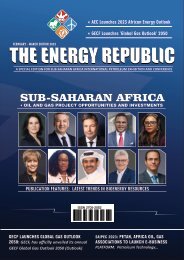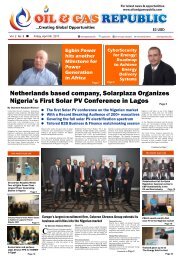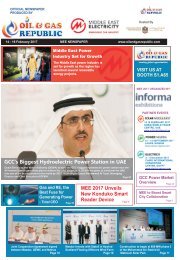The Energy Republic July Edition 2022
This magazine is a Special Edition focused on the NOG Conference and Exhibition 2022. The Nigeria oil and gas industry is undergoing a transformation following the recent policy enactment such as the Petroleum Industry Act (PIA) and ‘Decade of Gas Initiatives’ led by the Federal Government of Nigeria. This years’ NOG Conference features world-class conference programmes, including panel sessions to enable industry stakeholders, players and government discuss strategies in funding Nigerian energy mix going forward. In this edition, we featured an exclusive interview with H.E Chief Timipre Slyva, Honourable Minister of State for Petroleum Resources, including stakeholders and experts commentaries which are aligned based on the global trends in the energy, oil and gas industry. For general inquiries, please email us at: info@theenergyrepublic.com
This magazine is a Special Edition focused on the NOG Conference and Exhibition 2022. The Nigeria oil and gas industry is undergoing a transformation following the recent policy enactment such as the Petroleum Industry Act (PIA) and ‘Decade of Gas Initiatives’ led by the Federal Government of Nigeria. This years’ NOG Conference features world-class conference programmes, including panel sessions to enable industry stakeholders, players and government discuss strategies in funding Nigerian energy mix going forward.
In this edition, we featured an exclusive interview with H.E Chief Timipre Slyva, Honourable Minister of State for Petroleum Resources, including stakeholders and experts commentaries which are aligned based on the global trends in the energy, oil and gas industry.
For general inquiries, please email us at: info@theenergyrepublic.com
You also want an ePaper? Increase the reach of your titles
YUMPU automatically turns print PDFs into web optimized ePapers that Google loves.
NOG FEATURES
Nigerian Independents have Critical Role to Play
in Boosting Domestic Gas Production
As oil majors like Shell, ExxonMobil,
TotalEnergies, among others divest
more of their onshore and shallow
water assets, Nigerian independents have a
critical role to play in boosting the country's
gas production, a research agency has said.
Hawilti, a pan-African investment and
commodities research agency, in its Nigeria
Natural Gas Research Programme 2022,
which was in compliment with the Nigerian
Gas Association (NGA), said that the
acceleration of divestment by the oil majors
over the past decade means that Nigerian
independents now have significant reserves
of associated and non-associated gas.
Hawilti is the official 'Research & Content
Partner' at the Nigeria Oil and Gas
Conference & Exhibition (NOG) taking place
from 4 - 7 July 2022 at International
Conference Centre in Abuja.
According to Hawilti's report, Nigeria has
developed an Energy Transition Plan which
shows that achieving net-zero by 2060 will
require investments of about $410 billion.
The country has chosen gas as its transition
fuel. At the United Nations COP-26 climate
conference in Glasgow in 2021, the country
committed to reaching net zero emissions
by 2060.
Under this plan, natural gas will play a
significant role in addressing the clean
cooking challenge, providing grid stability,
and driving economic growth to lift millions
of Nigerians out of poverty.
"As IOCs continue to divest from their
onshore and shallow water assets in the
Niger Delta, most of Nigeria’s gas reserves
are up for grab by local and international
independents. With the acceleration of the
divestment pace over the past decade,
several Nigerian independents already sit on
significant reserves of associated and nonassociated
gas. These notably include assets
such as OML 17 (Heirs Oil & Gas), OML 18
(Eroton E&P), OML 24 (NewcrossEP), OML
34 (ND Western), OML 42 (Neconde
Energy), OML 55 (BelemaOil), OMLs 83 & 85
(First E&P), and OMLs 4, 38 & 41 (Seplat
Energy)," Hawilti said.
"Marginal fields have also been able to
support thegrowth of new gas hubs,
including at Ogbele on OML 54 (Niger Delta
E&P) or at Uquo on OML 13 (Savannah
Energy). Current market dynamics in Nigeria
mean that local and international
independents are increasingly going to be
responsible for the production and supply
of natural gas moving forward.
"IOCs are indeed expected to focus only on
brownfield deep-water oil projects, while
continuing to divest from onshore and
shallow water licenses. The PIA has fallen
short of incentivizing deep-water gas
production, so key undeveloped gas fields
such as Bilah (OML 129) and Nnwa-Doro
(OML 129, OML 135) are unlikely to be
developed soon. As a result, the only deepwater
gas projects one can expect are the
ones seeking to cut flaring on existing FPSOs
and oil production facilities. This is the case
at Agbami for instance where Chevron is
expected to sanction the Agbami Gas
Project if and once the field’s production
license is renewed beyond 2024."
In March 2021, Nigerian President
Muhammadu Buhari, declared 2021-2030
as the Decade of Gas in the country. The
initiative aims to make Nigeria a gas
powered economy by 2030. In August 2021,
Buhari also assented to the Petroleum
Industry Bill (now Petroleum Industry Act).
The PIA is seen by industry players as an
investment driven legal framework, which
has the potential to help the country
harness its huge hydrocarbon resources for
economic growth and development.
In the last 20 months, there have been
several commitments to deepen domestic
utilisation of gas in Nigeria. These includes
both public and private sector programmes.
In August 2020, the Central Bank of Nigeria
(CBN) launched a N250bn intervention
facility. This was followed by the launch of
the National Gas Expansion Programme
(NGEP) in December 2020 by the Federal
Government.
On the tax and policy front, Hawilti said that
machinery and equipment purchased for
the utilization of gas in downstream
operations remain exempt from Value
Added Tax (VAT), adding that companies
engaged in gas utilisation (downstream) can
also get a tax holiday of three to five years.
"The newly-enacted PIA provides additional
tax incentives, including for midstream and
downstream petroleum operations. These
notablyinclude a new reduced royalty and
taxation system for gas, and an additional
five-year tax holiday for investors in gas
pipelines," Hawilti said.
"However, these incentives have so far
paled in comparison to the capital-intensive
nature of developing and operating gas
projects in Nigeria. In addition, industry
stakeholders have pointed out to several
policy inconsistencies when it comes to
promoting the adoption of gas in the
country.
34
Funding The Nigerian
Mix For Sustainable Economic Growth
THE ENERGY REPUBLIC I SPECIAL EDITION















